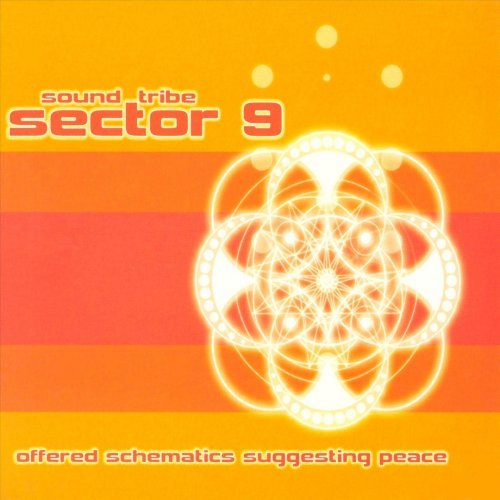Today we look back to February 2001 for this conversation between Jambands.com site founder/editor Dean Budnick and STS9 guitarist Hunter Brown. This was our first feature on the group.

D- Let’s start by talking about yourself. When I’ve seen the band or heard live recordings, one of the things that I find compelling is not just what you play but also what you choose not to play. I like your sense of restraint and dynamics.
H- It’s really a collective movement. The music is a collective rhythm, all these people are entwined in one cloth. It’s not about showcasing, unless it is. We’ve been a really rhythm-heavy band from the get-go. It’s not an “I’m going to solo” attitude or an “I’m not going to solo” attitude. We just try to put a collective musical thought out there.
D- In that context is there any musician who you personally emulate? Anyone whose ethos or perspective you bring to bear on your performance style?
H- I would say I’m a percussive player but emulate isn’t the right word.. When I first focused on music I was more into keyboard players. Herbie Hancock really touched me in a big way. The guitar players I really loved I couldn’t emulate- people like John McLaughlin, Pat Metheny and John Scofield. I try to keep my scopes wide open. John McLaughlin, in particular, is an amazing inspiration holistically, as a person, and what he’s chosen to do with his music and his life. My intention is to be truthful to myself and how I feel. I don’t try to latch on to anyone’s playing but I acknowledge everything I hear and take to heart so I’m sure it comes through.
D- Let’s talk about how that is realized with the band. You began as a trio?
H- I knew the bass player [David Murphy] when I was 13 years old. We played together in high school for fun. Then I met Zach [Velmer] the drummer. He was in a band already and I kind of joined that band for a while. Zach and I really hit it off and I said, “I know this bass player, we should try it out some time.” So the three of us opened up for this other band and played between sets and then we finally just gave up the other band altogether and went on as a three piece.
D- You recorded Interplanetary Escape Vehicle not long after expanding into a quartet right?
H- We’d been with [David] Phipps for only a few months. It was a real spur of the moment thing. Our main intention was to capture where we were at that moment, to have something to share with people to get shows and get us in doors. It was a three day thing. We did it live with everybody in the same room together, no overdubs, and nailed it out.
D- I know a number of people who are still entranced by that disc. I’m curious, what are your impressions of it?
H- I’m really proud of that album. I look back on it and just smile because I think we did an amazing job of capturing where we were at that time and where we were going. We’ll probably do the same kind of recording technique in the future.
D- As opposed to this last time out where you went it and created the music piece by piece. Although this time, you decided to do it on analog machines which some might suggest is counter-intuitive.
H- Absolutely, For sure, what better reason to do it (laughs). We wanted to try that out. A friend of ours had a completely analog studio and it just seemed right. It was really hard but we learned quite a bit from the work that we had to do on the analog machines. We were dealing with tape so to do any type of looping, which is what we did on some of the drum tracks sand rhythms tracks, we had to take a razor blade and cut a piece of two inch analog tape and splice it back together. You have to shave millimeters off at a time to get it right. I was working at two analog machines trying to synch things the way you would two turntables. Then the first thing we did was we mastered it to vinyl. It was helpful to work with this organic level of recording, to get those fundamentals. We figure its going to pay off when we go into other realms where things are much easier. Granted the sound is lost…
D- You find that analog is a warmer sound?
H- I testify. It’s true. We mastered it to vinyl first and then we mastered it to CD. I had a copy in the studio of the vinyl at the same time the CD was playing. I had an A/B button going from vinyl to CD. Vinyl sounded like the biggest open room, massaging your organs and your body. Then I clicked to B, to CD and the whole thing just compressed into a little cup of music. It’s phenomenal what the difference is. We hope to get a little piece of that vinyl out although it didn’t work out right away.


No Comments comments associated with this post